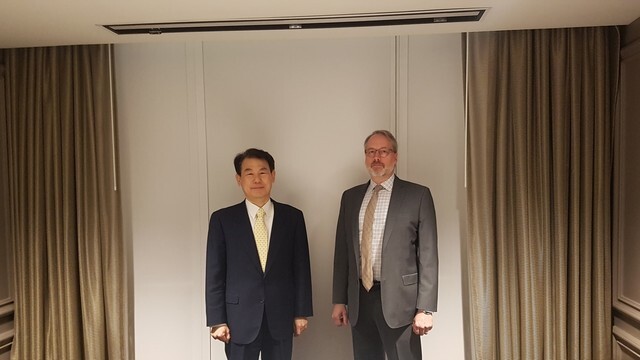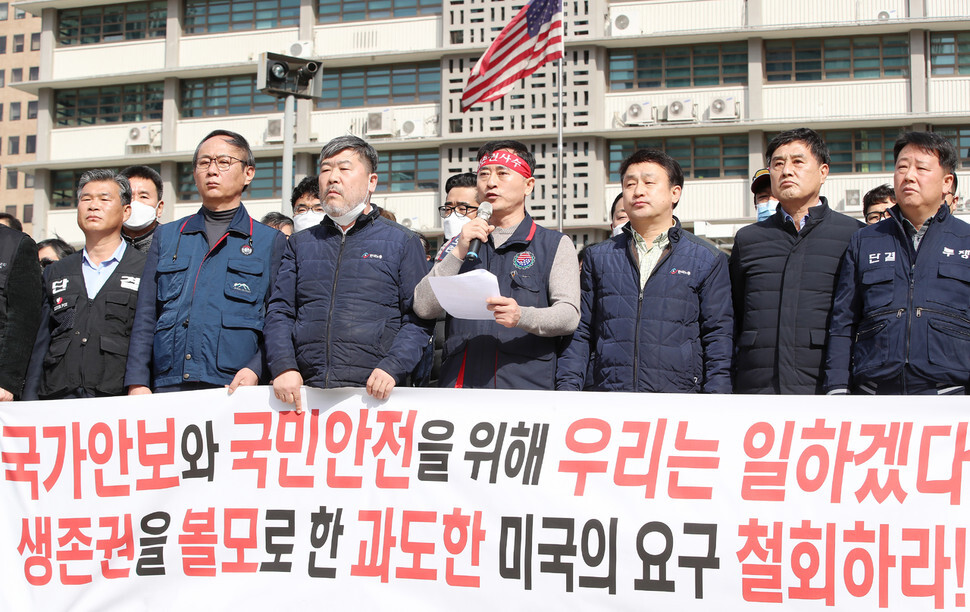hankyoreh
Links to other country sites 다른 나라 사이트 링크
[Editorial] US needs to move toward resolving pay of USFK’s S. Korean workers immediately

South Korea and the US are making little progress in their defense cost-sharing negotiations. On Mar. 17, the two sides launched their seventh round of negotiations, held in the US, with the goal of concluding the 11th Special Measures Agreement (SMA). But over the course of three days, they only reaffirmed their disagreements without reaching any conclusions. This situation can be largely attributed to the US’ high-handed approach to the negotiations, and its demand for unilateral concessions from South Korea.
First of all, the cost-sharing contribution that the US is demanding is absurdly high. The US is reportedly asking for US$4 billion: that’s less than its original demand of US$5 billion, but still far higher than the 10% increase from last year’s contribution that South Korea has assumedly proposed. Given the rate of inflation, 10% is hardly a small increase. Unless the US lowers its demand to a reasonable amount, the two sides are unlikely to reach a deal.
Because of such considerations, South Korea proposed during the seventh round of negotiations that the two sides settle wages for South Koreans employed by US Forces Korea (UFSK) before moving on to bigger issues. According to this proposal, South Korea would hand over payroll costs under the terms of last year’s agreement for now and then fulfill the rest of its obligations after the final deal has been struck. But the US rejected this proposal on the grounds that it would make it harder to reach a comprehensive cost-sharing agreement, and it’s still threatening to furlough South Korean workers without pay on Apr. 1.

We have to conclude that the US is holding the South Korean workers hostage in a bid to gain the upper hand in the negotiations. On Mar. 20, the labor union representing the USFK employees called for the US to retract its threatened furlough, which it criticized as being “a blot on the history of the ROK-US alliance that undermines the spirit of the alliance.” The union also vowed that its members would continue going to work even if they’re furloughed. If the US truly values its alliance with South Korea, it must not ignore the voice of the South Korean workers.
It’s obvious that the US’ unilateral and unreasonable demands are to blame for the prolongation of the cost-sharing negotiations and the looming possibility of a furlough. But the US has tried to pin the responsibility on South Korea, claiming that its lack of flexibility has put the negotiations in jeopardy. Passing the buck like this isn’t the appropriate attitude to take in the negotiations. Even if an agreement can’t be reached for now on the larger cost-sharing agreement, the US ought to at least show some good will by reaching an agreement on workers’ wages. We hope that the South Korean government will put its negotiating skills to good use while prioritizing the national interest and convince the US to take a reasonable stance in the negotiations.
Please direct comments or questions to [english@hani.co.kr]

Editorial・opinion
![[Editorial] Penalties for airing allegations against Korea’s first lady endanger free press [Editorial] Penalties for airing allegations against Korea’s first lady endanger free press](https://flexible.img.hani.co.kr/flexible/normal/500/300/imgdb/original/2024/0502/1817146398095106.jpg) [Editorial] Penalties for airing allegations against Korea’s first lady endanger free press
[Editorial] Penalties for airing allegations against Korea’s first lady endanger free press![[Editorial] Yoon must halt procurement of SM-3 interceptor missiles [Editorial] Yoon must halt procurement of SM-3 interceptor missiles](https://flexible.img.hani.co.kr/flexible/normal/500/300/imgdb/child/2024/0501/17145495551605_1717145495195344.jpg) [Editorial] Yoon must halt procurement of SM-3 interceptor missiles
[Editorial] Yoon must halt procurement of SM-3 interceptor missiles- [Guest essay] Maybe Korea’s rapid population decline is an opportunity, not a crisis
- [Column] Can Yoon steer diplomacy with Russia, China back on track?
- [Column] Season 2 of special prosecutor probe may be coming to Korea soon
- [Column] Park Geun-hye déjà vu in Yoon Suk-yeol
- [Editorial] New weight of N. Korea’s nuclear threats makes dialogue all the more urgent
- [Guest essay] The real reason Korea’s new right wants to dub Rhee a founding father
- [Column] ‘Choson’: Is it time we start referring to N. Korea in its own terms?
- [Editorial] Japan’s rewriting of history with Korea has gone too far
Most viewed articles
- 160% of young Koreans see no need to have kids after marriage
- 2Presidential office warns of veto in response to opposition passing special counsel probe act
- 3Months and months of overdue wages are pushing migrant workers in Korea into debt
- 4Japan says it’s not pressuring Naver to sell Line, but Korean insiders say otherwise
- 5S. Korea “monitoring developments” after report of secret Chinese police station in Seoul
- 630th anniversary Wednesday Demonstration pushed out of memorial site by far-right
- 7[Editorial] Penalties for airing allegations against Korea’s first lady endanger free press
- 8[Special reportage- part I] Attending the funeral of the victim of a South Korean war crime in Vietn
- 9Korean cookbook boom brings work of culinary masters to global audiences
- 101 in 5 unwed Korean women want child-free life, study shows